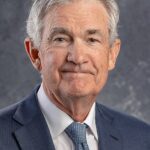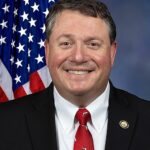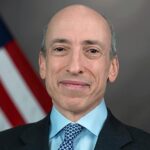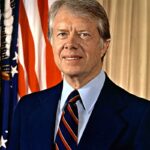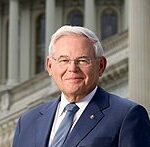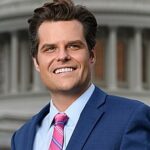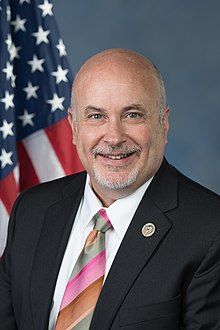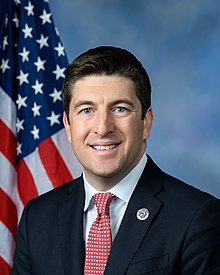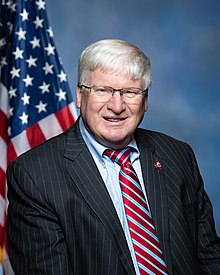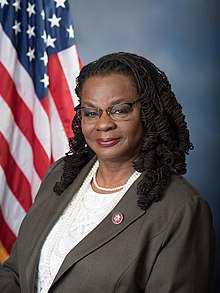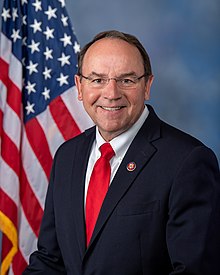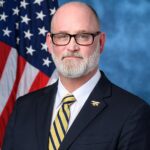 Rep. Derrick Van Orden is a Republican representing Wisconsin’s 3rd Congressional District in the U.S. House of Representatives. He was elected in 2022 and began serving in January 2023. The district, located in western Wisconsin, includes cities such as La Crosse, Eau Claire, and Stevens Point. Van Orden, a retired Navy SEAL and political newcomer prior to his congressional career, succeeded Democrat Ron Kind, who retired after serving more than two decades. As a first-term member of Congress, Van Orden has positioned himself as a strong conservative voice, focusing on national security, veterans’ issues, and economic policies affecting rural communities.
Rep. Derrick Van Orden is a Republican representing Wisconsin’s 3rd Congressional District in the U.S. House of Representatives. He was elected in 2022 and began serving in January 2023. The district, located in western Wisconsin, includes cities such as La Crosse, Eau Claire, and Stevens Point. Van Orden, a retired Navy SEAL and political newcomer prior to his congressional career, succeeded Democrat Ron Kind, who retired after serving more than two decades. As a first-term member of Congress, Van Orden has positioned himself as a strong conservative voice, focusing on national security, veterans’ issues, and economic policies affecting rural communities.
Policy Effectiveness and Legislative Record
Since taking office, Van Orden has sponsored and co-sponsored legislation tied to national defense, agriculture, and healthcare for veterans. He has highlighted his military background by prioritizing defense readiness and advocating for support programs for service members and their families. Early in his term, he introduced or supported bills aimed at improving mental health services for veterans, as well as legislation designed to bolster agricultural competitiveness in rural Wisconsin.
Van Orden also serves on committees that align with his stated priorities. He sits on the House Committee on Agriculture, where he participates in shaping farm policy and agricultural appropriations. Additionally, he serves on the House Committee on Transportation and Infrastructure, where he has voiced support for federal investment in rural roads and broadband access. His committee involvement provides him with a role in key legislative debates over funding and regulatory frameworks that directly impact his district.
Key Votes and Voting Record
During his first year in office, Van Orden has maintained a voting record that is strongly aligned with the Republican Party. He voted in favor of measures to limit federal spending, opposed expansions of federal regulatory authority, and supported efforts to roll back certain Biden administration policies on energy and environmental regulation. He has backed legislation promoting domestic energy production and has been vocal in supporting U.S. oil and natural gas development as part of a broader energy independence strategy.
Van Orden has generally voted in line with House Republican leadership, with data showing a high alignment rate above 90 percent. He has opposed Democratic-led initiatives on gun control, federal social spending, and climate-related legislation. Notably, he supported Republican measures to enhance border security and restrict federal agencies’ ability to issue new regulatory rules without congressional oversight. So far, there are few examples of Van Orden breaking from party lines, as he has emphasized a consistent commitment to the Republican agenda.
Ethics and Controversies
Van Orden’s time in Congress has not been free of controversy. He has faced media scrutiny for an incident in 2021, prior to taking office, when he was accused of disruptive behavior at a local library over a book display. In office, he attracted criticism for using profanity toward Senate pages during a late-night session at the U.S. Capitol in July 2023. He later acknowledged the incident but emphasized his frustration at what he viewed as disrespectful behavior in the chamber. While these incidents did not result in formal ethics violations or sanctions, they have drawn attention and sparked debate about his conduct in public office.
Constituent Service and Public Engagement
Van Orden has made constituent service a stated priority, citing his office’s work in assisting veterans with benefits claims and navigating federal agencies. He frequently communicates through social media, issuing statements on national security, economic policy, and local issues relevant to Wisconsin’s 3rd District. Van Orden has participated in town halls and community events, though his style of public engagement has sometimes drawn both praise and criticism. Supporters highlight his accessibility and straightforward communication, while detractors have raised concerns about the confrontational tone he sometimes adopts in public forums.
Bipartisanship and Collaboration
As a first-term representative, Van Orden’s record of bipartisan collaboration is still developing. He has joined with members of both parties on veteran-related initiatives, particularly in the area of mental health services and support for military families. However, most of his legislative record reflects partisan priorities in line with the Republican caucus. While he has not established himself as a frequent cross-party negotiator, Van Orden has indicated willingness to work across the aisle on issues of agriculture, rural infrastructure, and veteran care, which have traditionally attracted bipartisan interest.
Recent Focus and Public Stances
In recent months, Van Orden has emphasized economic issues affecting rural communities in Wisconsin. He has advocated for expanding rural broadband access, supporting dairy farmers, and ensuring that agricultural producers have fair access to domestic and international markets. On national policy, he has been vocal about border security, energy independence, and opposition to what he characterizes as excessive federal spending. He has also taken firm stances on foreign policy, backing continued U.S. support for allies while urging caution about extended foreign commitments that he argues could distract from domestic priorities.
Conclusion
Rep. Derrick Van Orden is serving his first term as the representative for Wisconsin’s 3rd District, where he has quickly established himself as a reliable Republican voice. His legislative priorities reflect his military background and focus on veterans’ issues, agricultural policy, and rural economic development. While he has faced controversies related to his public behavior, he continues to maintain strong support among his party’s base. His performance in Congress demonstrates a close alignment with Republican leadership and policy goals, while leaving open the question of how broadly he will engage in bipartisan work as his tenure continues. As a relatively new member, his effectiveness and influence are still taking shape, with his future role in shaping policy dependent on both his committee contributions and his ability to balance party loyalty with the unique needs of his district.
